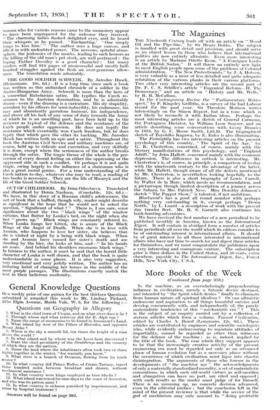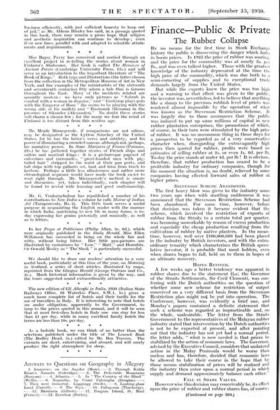More Books of the Week
(Continued from page 853.) Is the machine, as an overwhelmingly preponderating influence in civilization, merely a Satanic device destined, and intended by "the Spirit which denies " finally to eliminate from human nature all spiritual idealism ? Or can altruistic endeavour and aspiration to all things beautiful survive and develop concurrently with, and independently of, the purely materialistic tendencies of this " mechanistic ern " ? This is the subject of an enquiry carried out by a collection of sixteen articles which form a volume, Toward Civilization, edited by Charles A. Beard (Longmans, Its. ad.). These articles are contributed by engineers and scientific sociologists who, while evidently endeavouring to maintain attitudes of impartiality, cannot be regarded as other than witnesses for the defence of the machine : as is, indeed, implied by the title of the book. The case which they support appears to be that the increasingly creative activity of the present engineering era must be regarded not only as an advanced phase of human evolution but as a necessary phase without the occurrence of which civilization must lapse into chaotic disintegration. The arguments of those who foresee in the developments of " the machine age " the acknowledgments of only a materially standardized morality, a set of materialistic conventions, in which such old-world virtues as self-sacrifice and abnegation can have no part, are cited and opposed ' • with such results as the reader must judge of for himself. There is no summing up, no concrete decision advanced, even in the editorial preface ; but the conclusion left in the mind of the present reVieVver is that while the service of the god of mechanism- may' only' 'amount" to " doing profitable
business efficiently, with just sufficient honesty to keep out of jail,': as Mr. Aldous Huxley has said, ina passage quoted in this book, there may remain a pious hope that religion and aesthetic inspiration can' Continue to 'develop ; even if on new lines, parallel with and adapted to scientific attain- ments and requirements.











































 Previous page
Previous page